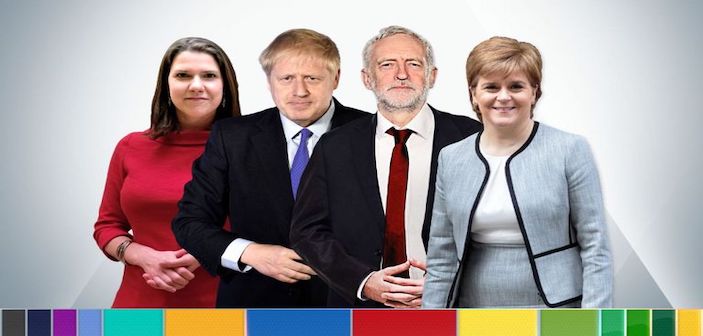On Thursday the country goes to the polls for the 2019 General Election. Political expert Jack Lambden (@_JackL_) looks at the betting for the overall outcome.
General Election | Thursday 12th December 2019
The 2019 General Election is set to be one of the most important of a generation as two polar-opposite leaders leading two polar-opposite parties go head-to-head to lead the UK through the next five years.
Despite Jo Swinson’s early claims that she could become Prime Minister, realistically only Boris Johnson or Jeremy Corbyn will be walking through the door of 10 Downing Street on 13th December knowing they have pulled off the biggest achievement of their political careers.
I doubt there has been as much backdrop to an election in quite some time with Brexit, Scottish independence, the future of the NHS and public service investment, climate change, trust and so many other debating points to factor into which party each of the electorate could vote for.
The odds on the overall outcome of the election (2/5 on a Tory majority at the time of writing) currently reflects the strong lead that the Conservatives hold in the opinion polls but as we learnt in 2015 and 2017, these should be read with caution as which party people ultimately end up voting for can sometimes not reflect what they have told a stranger who stops and asks them in the street.
The previous ‘shy Tory’ phenomenon (voters not admitting to pollsters that they planned to vote Tory) seemed to have turned to ‘shy Corbyism’ in 2017 as the self-confessed Socialist drew in support from areas that Labour has never previously had a strong hold, at least not since Tony Blair’s landslide 1997 victory.
Below is a summary of what I believe each of the main party’s perceived strengths and weaknesses are heading into the election.
Conservatives
Strengths:
- The party is untied on delivering Brexit, the biggest foreign policy issue since the second world war. Whilst they may not see Boris Johnson’s deal as perfect, 3 ½ years of debate and delay means that many of the electorate, whether they voted to leave or not, could be persuaded to vote for Johnson’s party as a way of ending the uncertainty and allowing the focus to shift to how the country can move forward once we have left the European Union which would likely be at the end of January if a Tory majority prevails. United parties win elections, quite simply.
- Those writing the Tory manifesto appear to have taken lessons from 2017’s version which caused uproar around controversial social care proposals and not included anything that is likely to be reversed in the run up to polling day. The commitment to spend, although not quite at the same level as Labour, can be seen as a step away from austerity which, whether or not it could be deemed necessary, has not been widely popular.
- The UK print media is largely supportive of another Conservative government and will persuade many of its readership with the pro-Johnson and anti-Corbyn rhetoric.
- The ‘triple lock’ tax freeze will be a popular policy amongst middle and lower income voters which are crucial to securing marginal seats across the country.
- The Brexit party standing aside in seats that the Conservatives already hold in Parliament is a boost to their chances of gaining an overall majority.
WeaknessesL
- The trustworthiness and integrity of Boris Johnson is probably the biggest obstacle in the race to 326 seats. Having been sacked twice in his previous career for lying, writing several perceived racist and homophobic statements in newspaper articles, the rumours surrounding affairs and his close relationship with US President Donald Trump, several voters may decide that they simply cannot vote for a man with this record and who is seemingly never too far away from a gaffe. At the start of this week, the perceived lack of care when shown a picture of the 4 year old boy who was treated on a hospital floor in Leeds because of a lack of beds, would have horrified but maybe not surprised many and could well have swung opinion for undecided voters.
- The NHS is an institution which incurs strong feeling, particularly when its future within a ‘free at the point of use’ construct is thrown in to any form of doubt. There is a perception amongst many that the Tories cannot be trusted with the NHS and that 9+ years of austerity and lack of funding has left the health service on its knees. Although Brexit is seen as the biggest issue at this election, the NHS is a close second and Labour’s claims that Johnson will put the NHS ‘up for sale’ in any future trade deal with the US may well stick with a large proportion of voters.
- Some of the tactics deployed by the Tories in their election campaign to date have been questionable to say the least. The relabelling of their Twitter handle to a fact checking account during one of the televised debates may not have broken election rules but wound people up who saw this as morally wrong.
Labour
Strengths:
- The number of young people registering to vote in recent weeks can only be a good sign for Labour considering the demographic of their ‘typical’ voter. As an example of the numbers, 206,000 people under 35 registered to vote on Friday 22nd November alone, the day of the ‘Question Time Leaders Special’.
- Some of the renationalisation plans, such as bringing the rail network back in public ownership, are popular amongst the masses as opposed to just Labour’s core support.
- Labour’s ground support numbers, who have been knocking on the doors during campaigning, is pretty impressive. Although the party may not have the financial backing that the Tories do in terms of donations, often the party have been sending supporters in by the bus load in marginal seats to spread the word about Labour’s policies.
- The relative success of the 2017 election, one which Corbyn and co were predicted to fall considerably short but ended up making ground on the Conservatives and denying Theresa May a majority, can be used as a platform for a better performance this time around.
- The social media presence of the party and their supporters, linked to their young support, is boarding on fanatical at times but will undoubtably have some effect on undecided voters.
- Although Corbyn has not made the inroads during the live TV debates he may have wanted, his performance in the Question Time Special seemed to go down better with the live audience and gave Labour a small spike in the polls in the following days.
Weaknesses:
- Doubts have been raised by the Institute for Fiscal Studies (IFS) about how realistic Labour’s radical proposals are considering the current state of the economy. Labour have claimed that their manifesto fully is fully costed by the IFS advice will have been a blow to hopes of persuading some undecided voters to vote for the party, especially those that remain sceptical about Labour’s role in the 2008 recession.
- Anti-Semitism is still a dark cloud that hangs over the party. Although the numbers of people dealing with complaints within the party has been doubled in recent times, senior Jewish figures have gone public with their disapproval over the party’s perceived lack of action.
- The shadow cabinet has come in for ridicule over the past few years in particular John McDonnell and Dianne Abbott, names that the Tories will use to scare voters into voting Conservative.
- Jeremy Corbyn’s popularity (again, according to the polls) amongst the general public makes for very poor reading. He is seen as too radical amongst centrist voters who believe Labour’s best years came in the late 90s/early 2000s. His support amongst his loyal followers though is completely unwavering.
- The party’s indecisiveness over Brexit could cost them dear. Corbyn himself was a ardent ‘leaver’ for years until becoming leader but has recognised that his entire cabinet, as well as most of their current MPs and a split of their voters are ‘Remainers’. Although Corbyn has declared he will take a neutral stance in the event of a 2nd EU referendum, this could put off those on both sides of the Brexit debate who may feel betrayed that he is not backing their side. Labour’s election strategy changed in the last week of November to try and focus more attention on those traditionally Labour voting Leave areas after their own polling, plus that of the MRP poll, showed that those key northern battleground seats were swinging towards Johnson’s Tories.
Liberal Democrats
Strengths:
- Success in the last round of local council elections and the European Parliamentary elections earlier this year have given the party confidence that they can improve on the number of seats they currently hold in parliament.
- Being involved in the ‘Remain Alliance’ with the Green Party and Plaid Cymru gives the party a better chance of winning seats with a strong remain electorate.
- This election could well see many tactical votes mopped up by the Lib Dems, again increasing their chances of gaining seats.
- In the event of a hung parliament, the Lib Dems know they are in a strong position to negotiate their way into government having not totally ruled out forming pacts with Labour or even the Tories.
Weaknesses:
- The party’s clear position on Brexit looks to actually be having a negative impact on their potential vote share. The Question Time Leaders Special saw remain voters express their disdain at the party putting a policy of revoking Article 50 altogether over and above holding a 2nd referendum which many see as more democratic, even if it still keeps alive the possibility of leaving the EU.
- If the polls are to be believed, Jo Swinson is not coming across at all well to the electorate which and could even face a tougher challenge than first expected in her own seat.
- Swinson, as well as the party in the general, are still baring the brunt of austerity policies that they voted through when in coalition government with the Conservatives from 2010 to 2015. The student vote that the party may well have had in 2010 as a seemingly viable alternative to the two main parties has been diminished with the trebling of tuition fees.
Scottish National Party (SNP)
Strengths:
- There is a strong pro-EU stance in Scotland which the party are using to their advantage to win over voters in their anti-Brexit position. 62% of Scotland voted to Remain which represented all 32 Councils in the country and the highest percentage of any of the UK nations.
- Nicola Sturgeon has performed well in the TV debates, fronting an honest assessment of where their party currently stand on the big issues affecting the Scottish people such as Brexit and Independence.
- The party look set to take advantage of Labour’s continuous fall of the vote share in Scotland by fronting up directly to the Tories in many of Scotland’s marginal seats.
- Ruth Davidson was a popular leader of the Scottish Conservatives so her resignation in August is a further boost to chances of winning seats off the Tories in Scotland.
Weaknesses:
- The party have come under criticism for Scotland’s drug problem which is seen as amongst the worst in the whole of Europe and the lack of action to effectively reduce the effects of the issue.
- Although it should have minimal impact, the allegations hanging over former leader Alex Salmond was an unwelcome distraction in the early weeks of campaigning.
- Those that believe in the Union in Scotland which, given the 2014 indyref vote and Tory gains at the last election could be seen as the majority, are unlikely to vote for the SNP if they believe there is a credible chance of it prompting a second independence vote in the next few years.
The betting verdict
Given all of the above, it’s hard to see past a Tory majority at this stage. In terms of two main candidates, neither appears very popular outside their base support but in a 50-50 choice, I think people are more likely to go with Boris Johnson despite his many pitfalls.
History proves (Michael Foot in the 1980s) that when the Labour party shifts to the left, the Tories often come out on top and although many of the more moderate Conservatives are no longer in the party, they may be seen as less ‘radical’ than Labour who’s policies are a big shift from the status quo.
The price on a Tory majority outcome alone is not even worth pursuing at the prices so the value looks to lie in predicting how large the majority could be.
Polling on this varies but my analysis of the seats gives the Tories a 20-odd seat lead over Labour with most gains likely in the North, Midlands and Wales in high leave voting areas. The party may lose one or two seats in the South West to the Lib Dems and in Scotland to the SNP but not enough to stop the charge.
The polling may suggest a 60-odd seat majority but I don’t think that factors in the number of young people that registered to vote before the 26th November deadline who are, in most cases, more likely to vote Labour.
The gap has narrowed slightly in the polls since the election was called, as it did in 2017, but the Conservative campaign has been nowhere near as bad as the one Theresa May led then and up until this week has been gaffe free from Boris.
Tactical voting is going to play a part in seats where the Lib Dems and SNP are neck-and-neck with the Tories which may dampen the majority but not to a significant enough degree in my view.
326 seats are needed for a majority in the House of Commons and SkyBet are offering 4/1 on the Conservatives to win 340-349 seats which gives a slight margin of error on my prediction either side.
330-339 seats is 9/2 (SkyBet) though and with so many marginal seats, it’s worth getting that on side too.
TOPICS Other Sports Specials TipsBest Bets
General Election 2019 – Conservatives to win 330-339 seats (9/2 SkyBet)
General Election 2019 – Conservatives to win 340-349 seats (4/1 SkyBet)








